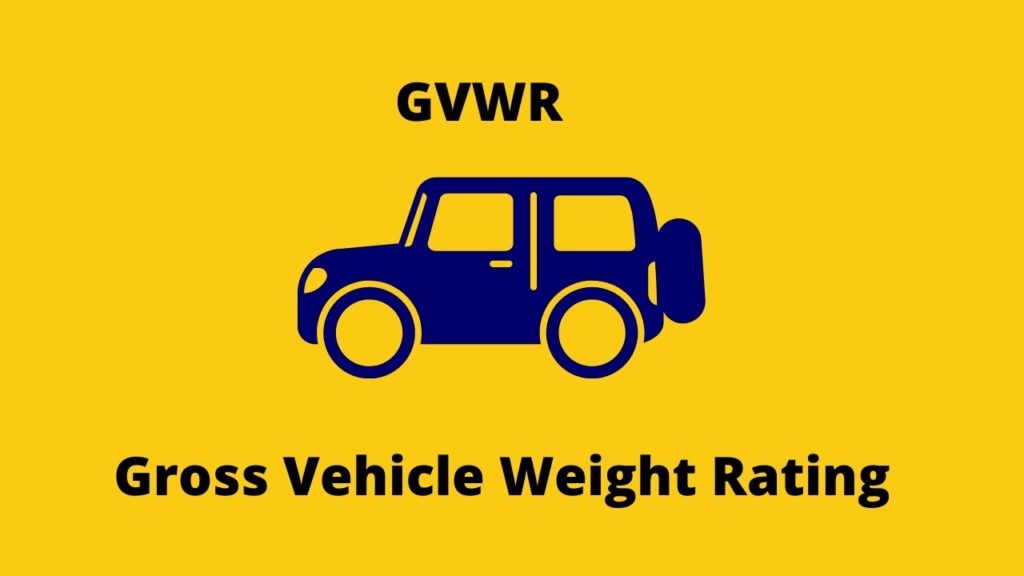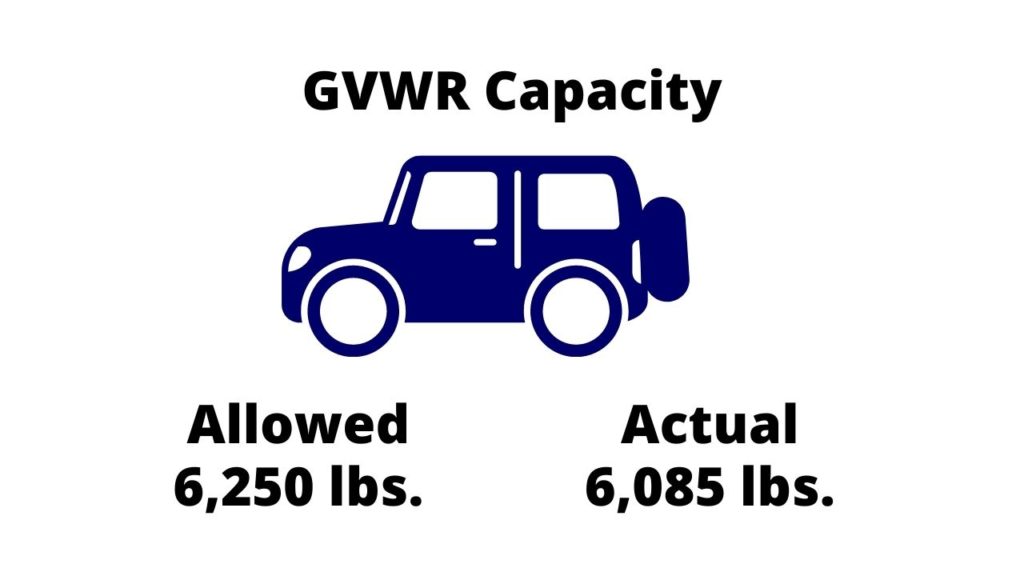Tow ratings are an important factor when it comes to knowing what size travel trailer your vehicle can safely tow.
These are the basic tow ratings you need to understand if you want to buy a travel trailer and you need to know if your vehicle can safely tow it. This is important information because towing too much weight can lead to your trailer swaying, causing you to lose control.
Yes, this can be very dangerous. So, you must know these numbers.
If you prefer to watch a video on YouTube that will also tell you “what determines tow ratings” click here to start watching: https://youtu.be/XyO4juiVDZE
I am not an expert and it can get more complicated but knowing these basic numbers are necessary.
There are four different tow rating calculations you need to know and each one is very important. And it gets really interesting as you’ll see.
Last year I bought a Jeep Gladiator Rubicon to tow my Little Guy Max travel trailer so I am going to use my tow rating numbers and show you how I was able to determine that the Jeep could tow my travel trailer so you can see a real-life example.
Contents
What Size Travel Trailer Can My Vehicle Tow?

Towing Capacity Explained
The first term most people think of when they want to know what size travel trailer their vehicle can tow is towing capacity.
Towing capacity is the maximum amount of weight your vehicle can safely tow. This number changes depending on how your vehicle’s features, what weight it is carrying, and how you distribute and control the load.

My 2020 Jeep Rubicon Gladiator has a towing capacity of 7,000 lbs.
Most vehicles have the towing capacity listed in the owner’s manual, or on the driver-side door jamb on a sticker. I could not find mine in either so I found mine online to find my tow capacity by VIN. You can look yours up here.

My travel trailer, the Little Guy Max has a dry weight of 3,100 lbs.
Sounds simple. Huh?
Does this mean my Jeep can safely tow my Little Guy Max travel trailer? There are three more calculations we need to do to know for sure.
GCWR (Gross Combined Weight Rating) Explained

The next tow rating calculation you need to know is GCWR. GCWR stands for Gross Combined Weight Rating.

GCWR is easy to understand. It is the total weight of the vehicle and your trailer with cargo combined.

My Jeep’s GCWR is 12,450 lbs.
I found this number in my owner’s manual or it can be found in your vehicle’s door jam.
Because my tow vehicle’s GCWR is 12,450 lbs. this is the maximum allowed weight for my Jeep and travel trailer with cargo combined.
First, let’s calculate what my travel trailer weighs with cargo.

I estimate there is about an extra 250 lbs. of cargo I keep inside my Little Guy Max trailer. This includes kitchenware, food, blankets, lanterns, my camera gear, etc.

In the outside storage space of my Little Guy Max trailer, I am estimating about 400 lbs. of cargo. Things like camping chairs, a grill, and tools can quickly add up in weight.

When I add both the inside and outside cargo weights to the dry weight of my travel trailer this totals 3,750 lbs.
Next, let’s calculate what my Jeep weighs with cargo.

The first number you need to add to your tow vehicle’s dry weight is the weight of all passengers.
Next, you need to add the weight of any pets who will be traveling in the vehicle. My dog Princess only weighs 10 lbs. but obviously if you have a larger dog or more than one your dog’s weight is going to be more.
Next, you need to estimate the weight of the stuff you travel with that is kept in the cabin, trunk, or bed of your vehicle. Things like clothing, a cooler, firewood, and anything else you will be hauling in your vehicle.
When I add the weight of people, pets, and all cargo to the weight of my Jeep this totals 5,710 lbs.
Now that I know what the total weight of my Jeep is with cargo, I add this number to the previous number I calculated for my trailer with cargo.

This gives me a total combined Jeep and travel trailer weight of 9,460 lbs.

Because my Jeep’s GCWR is 12,450 lbs. and my actual combined vehicle and trailer weight with cargo is 9,460 lbs. my Jeep passes the Gross Combined Weight Rating calculation.
If the total weight combined of your tow vehicle with cargo and your travel trailer with cargo exceeds your vehicle’s GCWR then your vehicle can not safely tow your travel trailer.
Looking at these numbers you might come to the conclusion that my Jeep could tow a travel trailer almost 3,000 lbs. heavier. But wait, we have two more calculations to do to get to the real towing capacity.
Payload Capacity Explained

The next important tow rating calculation you need to know is your tow vehicle’s payload capacity. Payload capacity is the total weight of your vehicle with passengers, and cargo plus the tongue hitch weight of your travel trailer.
A travel trailer’s hitch weight is the weight or the pressure that is applied from the trailer’s tongue to the hitch on your vehicle.

My Jeep’s payload capacity is 1,152 lbs.
You can find this number in the vehicle door jam. It will say: Combined weight of occupants and cargo should not exceed: and this is the vehicle’s payload capacity.

There are hitch weight tools you can use to find out exactly what your hitch weighs but if you do not own one then to calculate your travel trailer’s hitch weight a good rule of thumb is to take the weight of your travel trailer with all of its cargo and multiple this number by 10 – 15%.
Previously, when I calculated my GCWR you saw that my travel trailer with both the inside and outside storage cargo weighed 3,750 lbs. so I multiplied this number by 10%. This gives me an estimated hitch weight of 375 lbs.
The more weight that is on the tongue of your hitch the more your hitch is going to weigh. So for example, if you have propane tanks and this is where your RV battery is kept, or if you have a heavier box on your hitch then your hitch weight maybe is closer to 15% or higher than your trailer’s total weight.

Previously when I calculated the people, pets, and cargo weight for my vehicle that total came to 660 lbs. and when I add my hitch weight to this number the total is 1, 035 lbs. My vehicle’s payload capacity is 1,152 lbs. so this number is really close.
Payload capacity is interesting because if my travel trailer’s tongue weight was just a few pounds heavier then I would exceed my vehicle’s payload capacity and this vehicle could not safely tow it.
Knowing my payload is just below my payload capacity there are precautions I take.
I do not travel with a full freshwater tank. Because 1 gallon of water weighs 8.3 lbs. so my 20-gallon freshwater tank when filled adds an additional 166 lbs. to the total weight of my travel trailer.
If your towing capacity, your GCWR, and your payload capacity do not exceed the tow rating of your vehicle you are just one calculation away from knowing your vehicle can safely tow your travel trailer.
If any of these numbers do exceed its rating then it cannot.
GVWR (Gross Vehicle Weight Rating) Explained

The next towing rating you need to know is GVWR. GVWR stands for Gross Vehicle Weight Rating.

GVWR is the maximum your vehicle is allowed to weigh, including your vehicle’s curb weight, plus cargo, plus the hitch weight of your trailer.
And we already have this information from our previous calculations.

My Jeep’s weight with cargo totals 5,710 lbs. The tongue hitch weight of my Little Guy Max is 375 lbs. This makes my total combined vehicle weight plus hitch weight 6,085 lbs.

The GVWR for my Jeep is 6,250 lbs. so this is a close GVWR.
Important Tow Rating Tips
For any of these vehicle numbers, I am talking about do not go by what the advertised numbers are because different makes and models come with different features and packages.
You need to look at your specific vehicle to get accurate numbers. I want to also say that you should never rely on an RV dealer to tell you if your vehicle can safely tow the travel trailer you want to buy. These are commissioned salespeople and not that they are purposely going to mislead you, but as I said every vehicle is different so without them doing these exact same calculations they can not tell you with 100% certainty that your vehicle can safely tow.
You need to be in charge of gathering your vehicle’s specific tow rating numbers because it is your safety and your family’s safety at risk.
It is important you never exceed any of these calculations, but some people recommend staying 10-20% below your vehicle’s ratings to be extra safe.
